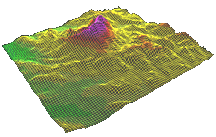
University Consortium for Geographic Information Science
43351 Spinks Ferry Road
Leesburg, Virginia 20176-5631
703-779-7980 (phone), 703-771-1635 (fax)
execdir@ucgis.org
www.ucgis.org
Our Mission
Spring 2000 Headlines
Vol. 2, No. 1

University Consortium for Geographic Information Science
43351 Spinks Ferry Road
Leesburg, Virginia 20176-5631
703-779-7980 (phone), 703-771-1635 (fax)
execdir@ucgis.org
www.ucgis.org
Our Mission
Spring 2000 Headlines
Vol. 2, No. 1
all articles written by Suzy Jampoler, except where indicated

UCGIS Considers Emerging Themes in GIScienceThe UCGIS Summer Assembly will be held on the western slope of Mt. Hood, Oregon from June 21-24, 2000, and hosted by Oregon State University. The Assembly is one of two annual business and professional meetings of the 50+ member institutions. The Consortium's last meeting was in Washington, DC, during February 2000, when members also met with representatives of federal agencies interested in geoscience, with home state congressional delegations, and with congressional committee staff members.One item on the agenda of the Summer Assembly will be a discussion of geoscience areas where future research is either necessary to clarify an issue or now possible because of the advances of technology and the development of new analytical tools - or both. Consortium members proposing seven "emerging themes for research" will present an introduction to each topic. Discussion and debate on these topics will be the major work of the Assembly. Members will vote on acceptance of the topics at the Council meeting. These seven include:
 Student Travel Grants and PresentationsOne highlight of the UCGIS Summer Assembly will be the presentation of award-winning research papers by six graduate students.Graduate students from GIScience-related disciplines countrywide competed for a small number of travel grants to attend this summer's UCGIS membership meeting. The grant winners come from 30 universities throughout the United States. The students will present their research at a poster session. There are six students from among the grant winners whose scholarship was judged to have exceptional merit. These six will present a paper on their research to the full assembly. They include:
|
UCGIS Awards FGDC Grants to Member InstitutionsOver the past year, UCGIS has continued a successful partnership with the Federal Geographic Data Committee (FGDC). Through a letter of agreement with FGDC, UCGIS has received $235,000 for grants to member institutions.Three grants of $30,000 each were awarded in response to the UCGIS RFP Exploratory Studies of the NSGIC/FGDC Framework Survey. Grant recipients are:
A second UCGIS RFP, Usability of User Interfaces to the National Geospatial Data Clearinghouse, was awarded to Oregon State University. Principal Investigators Dawn Wright and Cherri Pancake won a $63,000 grant to develop multi-level "humane" interfaces. The State University of New York, Principal Investigator Alan MacPherson, was recently awarded a $45,000 grant in response to the UCGIS RFP Evaluation of FGDC's NSDI Grants Program. The University of Wyoming completed a grant, Development of a Course Material Package and Marketing Strategy for the Geospatial Data Community, in 1999. The cooperative partnership with FGDC began with a small grant of $50,000. As our member institutions have provided useful and timely research to FGDC, the number and dollar amount of the grants has grown. These grant opportunities are open only to UCGIS member institutions, and are a significant benefit of membership. UCGIS anticipates that the cooperative partnership with FGDC, and other funding agencies, will continue to grow. Look for more research opportunities in the coming year on the UCGIS web page, www.ucgis.org/f2oppor.html. The UCGIS Research Projects Committee, headed by Max Egenhofer, circulates solicitations, reviews proposals, and recommends awards.
 UCGIS and USGS Host Symposia on GIScience and Vector-Borne DiseaseUCGIS identified public health and human services as one of the critical GI Science applications areas at the Minneapolis Summer Assembly. As part of the on-going efforts to emphasize this topic, UCGIS will team with the United States Geological Survey (USGS) to present two symposia on the application of GI Science to the study of environmental influences on vector-borne diseases. Art Getis, of member institution San Diego State University, heads the steering committee for the meetings. USGS is a federal member of UCGIS.A program of joint research (the Human Health Initiative, HHI) is underway with scientists at the Centers for Disease Control and Prevention and the Geological Survey to examine the environmental influences on vector-borne diseases. The topic encompasses the incorporation of geographic information systems, remote sensing and spatial analysis tools into examining the environmental influences on vector-borne diseases. USGS has asked UCGIS to organize two meetings where scientists from government agencies, private sector, and academic institutions will investigate how GI Science can be incorporated into disease research. The goals of the meetings are to:
For more information, contact Suzy Jampoler, execdir@ucgis.org, or Art Getis, arthur.getis@sdsu.edu.
 Avoiding Listserv Lunacy
Over the past year UCGIS has had good success with a new listserv software
called Lyris which features automatic error mail handling, multiple
level security, and failsafe unsubscribing that prevents those annoying
"get me off this list!" messages. It also has an easier, web-based
interface for subscribers and adminstrators. Below are a few listserv
reminders and/or tips to ensure a pleasant UCGIS emailing experience:
|

Challenges is an occasional publication of the UCGIS.
For submissions, corrections, comments or questions, please contact
Dawn Wright,
dawn@dusk.geo.orst.edu.
